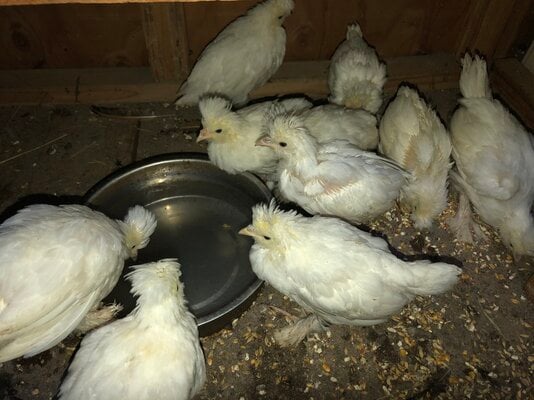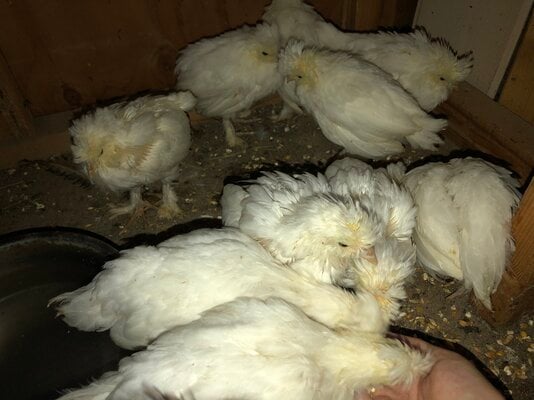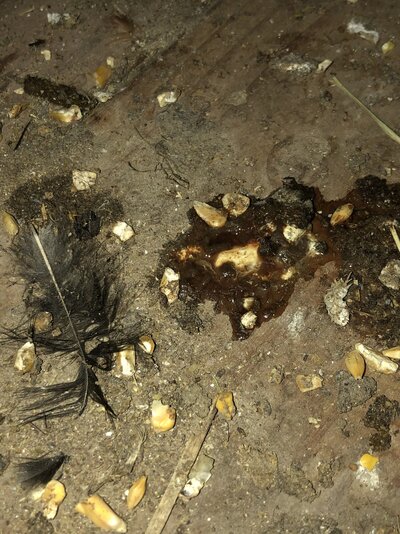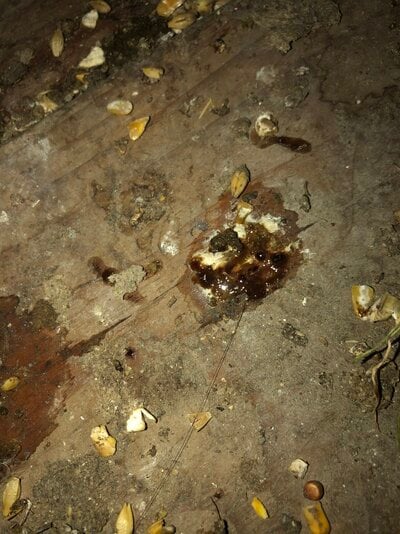- Aug 18, 2016
- 27
- 14
- 84
Hello,
I have a batch of 1 month old chicks, 12 white sultans and 4 silkies. They are living in a caged shelf compartment inside the main coop of our chickens in warm California weather. There is almost no light source inside besides the door leading into it, so they are provided night lights when it gets dark.
Just now we found 1 dead and one laying on its side, both with their butts covered in diarrhea that has a slight red tint in some blotches. All of the white sultan chicks felt lighter than they should be and had empty crops that only felt slightly squishy. They were also squinting, some puffed up, and just stood around quietly (they are usually really skittish). They also acted more slow and clumsy, and stumbled a bit weakly when I tried to move them around.
I had not been the one taking care of them, so I don't know of their past behavior prior to this, but I immediately brought them some nutridrench and electrolyte mix water to drink, and some of them seemed extremely thirsty. While drinking, one of them had a cecal type poop except it was mixed with some white and red tints, the consistency was entirely pudding like with no chunks or solids. The texture and color of the poop matched the stains on the dead and extremely lethargic chicks. The lethargic one cannot stand or sit upright on its own and leans over into its side constantly with eyes closed, but after drinking the boost for a bit was able to keep her eyes open a little longer, but is otherwise still weak, does not eat, and just falls over to lay on its side.
I am trying to determine if this was caused by coccidiosis (I am not aware of any infected chickens), or the fact that they did not eat/drink because they could not see in there. We had raised more than 50 chicks with no issues in the same brooder compartment with the same nightlighths provided.
Right before I noticed their behavior and blood tinted diarrhea (cecal?), we transferred 47 almost 2 week old chicks into the same brooder, so I am extremely worried that they'd need to be evacuated asap if it does end up being coccidiosis.
Here are a few pictures for reference:
The bloody poop by one of the thirsty chicks

The chicks relocated to a brighter coop, huddling in the corner of the floor and drinking:

A few chicks are eager to eat from my hand, while the others don't react much and just huddle still in the back (not sure if sickness or sleepy because it's dusk):

Some additional poops that have red tints NOT made by them, found inside the coop they were relocated to:


Sorry for the nasty pictures, I would just like to find the root of the problem and save the lethargic chick if possible, as well as keeping the 47 babies safe and healthy.
Any suggestions on what may be the cause, how I can help the lethargic chick, if I should order coccidiosis medicine now and if that would still save them in time, is appreciated. Thanks!
I have a batch of 1 month old chicks, 12 white sultans and 4 silkies. They are living in a caged shelf compartment inside the main coop of our chickens in warm California weather. There is almost no light source inside besides the door leading into it, so they are provided night lights when it gets dark.
Just now we found 1 dead and one laying on its side, both with their butts covered in diarrhea that has a slight red tint in some blotches. All of the white sultan chicks felt lighter than they should be and had empty crops that only felt slightly squishy. They were also squinting, some puffed up, and just stood around quietly (they are usually really skittish). They also acted more slow and clumsy, and stumbled a bit weakly when I tried to move them around.
I had not been the one taking care of them, so I don't know of their past behavior prior to this, but I immediately brought them some nutridrench and electrolyte mix water to drink, and some of them seemed extremely thirsty. While drinking, one of them had a cecal type poop except it was mixed with some white and red tints, the consistency was entirely pudding like with no chunks or solids. The texture and color of the poop matched the stains on the dead and extremely lethargic chicks. The lethargic one cannot stand or sit upright on its own and leans over into its side constantly with eyes closed, but after drinking the boost for a bit was able to keep her eyes open a little longer, but is otherwise still weak, does not eat, and just falls over to lay on its side.
I am trying to determine if this was caused by coccidiosis (I am not aware of any infected chickens), or the fact that they did not eat/drink because they could not see in there. We had raised more than 50 chicks with no issues in the same brooder compartment with the same nightlighths provided.
Right before I noticed their behavior and blood tinted diarrhea (cecal?), we transferred 47 almost 2 week old chicks into the same brooder, so I am extremely worried that they'd need to be evacuated asap if it does end up being coccidiosis.
Here are a few pictures for reference:
The bloody poop by one of the thirsty chicks

The chicks relocated to a brighter coop, huddling in the corner of the floor and drinking:

A few chicks are eager to eat from my hand, while the others don't react much and just huddle still in the back (not sure if sickness or sleepy because it's dusk):

Some additional poops that have red tints NOT made by them, found inside the coop they were relocated to:


Sorry for the nasty pictures, I would just like to find the root of the problem and save the lethargic chick if possible, as well as keeping the 47 babies safe and healthy.
Any suggestions on what may be the cause, how I can help the lethargic chick, if I should order coccidiosis medicine now and if that would still save them in time, is appreciated. Thanks!
Last edited:




